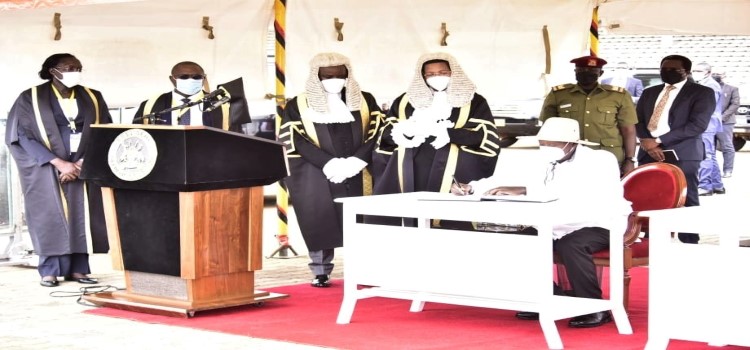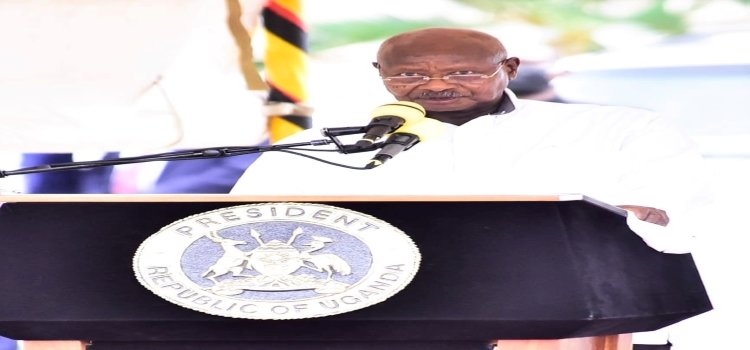President lines up 62 Bills in State-of-the Nation Address

The Executive will table 62 Bills before Parliament for processing in the second session, President Yoweri Museveni has revealed.
Museveni made the revelation during his State-of-the Nation Address to Parliament on Tuesday, 07 June 2022 at the Kololo Ceremonial Grounds in which he exuded confidence in the economy’s ability to recover from rising inflation, saying his government has mustered the ability to emerge from difficult situations.
The State-of-the Nation Address, a constitutional requirement by the President, is delivered at the opening of a new session of Parliament and in this case, the start of the second session or second year of the 11th Parliament.
Some of the key bills include the National Health Insurance Scheme Bill, the Land Acquisition Bill, the Competition Bill, the Anti-Terrorism Bill, the Small Arms and Light Weapons Control Bill, the Transitional Justice Bill, the Valuations Bill, the Labour Unions (Amendment) Bill and the National Teachers’ Bill among others.
The National Health Insurance Scheme Bill seeks to roll out health care countrywide and the Land Acquisition Bill, according to the President, seeks to check individuals who frustrate investment projects by making it hard for government to acquire land.
President Museveni saluted the 11th Parliament for passing a record 23 bills in the first session [year] with emphasis on the East African Crude Oil Pipeline (EACOP) (Special Provisions) Bill, 2021 and the Electricity (Amendment) Bill, 2022 that among others allows industrial parks to tap power directly from transmission, bypassing umeme, the private entity licenced to distribute and supply electrify.
“The bulk of the 11th Parliament have been acting positively. I congratulate everybody, especially the Speaker and Deputy Speaker,” Museveni said.
In his address amid rising fuel and commodity prices, Museveni said government will be clutching on commercial agriculture, import substitution through manufacturing and security as an enabler of socio-economic activities.
“…[we’ve dealt with the] locusts, the rising water on the lakes, the floating islands, the landslides, the terrorist bombs, the COVID-19 and now the rising commodity prices artificially created by the war in Ukraine,” he said.
Already, he said, Uganda has hit the Gross Domestic Product (GDP) per capita of US$1056, which qualifies the country as a lower middle income country.
“The GDP per capita is US$1056; the entry point for the lower middle income status is US$1036….we have now passed that figure; our economy expanded inspite of the COVID-19 lockdown,” he said.
Museveni dismissed opposition activist Dr Kizza Besigye’s recent protests over the rising cost of living, terming it as disruptive and that security forces will contain him.

“We have negative fellows like Dr Kizza Besigye walking to work; if you are walking peacefully, who will bother you? Didn’t you see those who walked to Namugongo recently? But if you walk to cause trouble, we shall cause trouble for you,” he said.
Voicing his support for the controversial Vinci Coffee Uganda deal that Parliament recently advised government to reject, Museveni said his intention is to balance the uneven coffee trade in the world, which profits other developed country at the expense of coffee producers.
“The global coffee trade is worth US$460 billion; of this figure, the coffee growing countries only get US$25 billion, and African growing countries get US$2.4 billion,” he said.
Museveni said he interested Ms Enrica Pinetti, the investor at the heart of the coffee deal controversy into the idea of adding value to coffee locally before export, saying it will significantly lift the country out of losing money to the international coffee industry.
“She [Pinetti] had no idea about coffee, but she had a wide network of contacts; I am the one who told her [to pick interest in coffee]; she was in hospitals,” he said.
The Head of State promised to meet all coffee stakeholders to bring them up to speed with his plans to have coffee processed prior to export.
Museveni said he will clamp down on local administrators lazy about protecting swamps from encroachers, actions he said sets the country up for climate disasters.
He implored businesspersons and investors suffering frustration from corrupt officials to report them, adding that severe actions will be taken against the corrupt.
